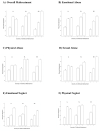Interaction between specific forms of childhood maltreatment and the serotonin transporter gene (5-HTT) in recurrent depressive disorder
- PMID: 22840631
- PMCID: PMC3825663
- DOI: 10.1016/j.jad.2012.05.032
Interaction between specific forms of childhood maltreatment and the serotonin transporter gene (5-HTT) in recurrent depressive disorder
Abstract
Background: There is inconsistent evidence of interaction between stressful events and a serotonin transporter promoter polymorphism (5-HTTLPR) in depression. Recent studies have indicated that the moderating effect of 5-HTTLPR may be strongest when adverse experiences have occurred in childhood and the depressive symptoms persist over time. However, it is unknown whether this gene-environment interaction is present for recurrent depressive disorder and different forms of maltreatment. Therefore, patients with recurrent clinically diagnosed depression and controls screened for the absence of depression were utilised to examine the moderating effect of 5-HTTLPR on associations between specific forms of childhood adversity and recurrent depression.
Method: A sample of 227 recurrent unipolar depression cases and 228 never psychiatrically ill controls completed the Childhood Trauma Questionnaire to assess exposure to sexual, physical and emotional abuse, physical and emotional neglect in childhood. DNA extracted from blood or cheek swabs was genotyped for the short (s) and long (l) alleles of 5-HTTLPR.
Results: All forms of childhood maltreatment were reported as more severe by cases than controls. There was no direct association between 5-HTTLPR and depression. Significant interactions with additive and recessive 5-HTTLPR genetic models were found for overall severity of maltreatment, sexual abuse and to a lesser degree for physical neglect, but not other maltreatment types.
Limitations: The cross-sectional design limits causal inference. Retrospective report of childhood adversity may have reduced the accuracy of the findings.
Conclusions: This study provides support for the role of interplay between 5-HTTLPR and a specific early environmental risk in recurrent depressive disorder.
Copyright © 2012 Elsevier B.V. All rights reserved.
Figures

Similar articles
-
Stressful life events and the serotonin transporter gene (5-HTT) in recurrent clinical depression.J Affect Disord. 2012 Jan;136(1-2):189-193. doi: 10.1016/j.jad.2011.09.016. Epub 2011 Oct 6. J Affect Disord. 2012. PMID: 21982504 Free PMC article.
-
Serotonin transporter length polymorphism, childhood maltreatment, and chronic depression: a specific gene-environment interaction.Depress Anxiety. 2013 Jan;30(1):5-13. doi: 10.1002/da.21982. Epub 2012 Jul 27. Depress Anxiety. 2013. PMID: 22847957
-
Early adversity and 5-HTT/BDNF genes: new evidence of gene-environment interactions on depressive symptoms in a general population.Psychol Med. 2009 Sep;39(9):1425-32. doi: 10.1017/S0033291709005248. Epub 2009 Feb 12. Psychol Med. 2009. PMID: 19215635
-
Depression and the serotonin transporter 5-HTTLPR polymorphism: a review and a hypothesis concerning gene-environment interaction.J Affect Disord. 2008 Nov;111(1):1-12. doi: 10.1016/j.jad.2008.04.009. Epub 2008 Jun 4. J Affect Disord. 2008. PMID: 18534686 Review.
-
[Posttraumatic stress disorder (PTSD) as a consequence of the interaction between an individual genetic susceptibility, a traumatogenic event and a social context].Encephale. 2012 Oct;38(5):373-80. doi: 10.1016/j.encep.2011.12.003. Epub 2012 Jan 24. Encephale. 2012. PMID: 23062450 Review. French.
Cited by
-
Investing in the Early Childhood Mental Health Workforce Development: Enhancing Professionals' Competencies to Support Emotion and Behavior Regulation in Young Children.Brain Sci. 2017 Sep 19;7(9):120. doi: 10.3390/brainsci7090120. Brain Sci. 2017. PMID: 28925955 Free PMC article.
-
Moderate Childhood Stress Buffers Against Depressive Response to Proximal Stressors: A Multi-Wave Prospective Study of Early Adolescents.J Abnorm Child Psychol. 2015 Nov;43(8):1403-1413. doi: 10.1007/s10802-015-0021-z. J Abnorm Child Psychol. 2015. PMID: 25911194 Free PMC article.
-
Effects of Different Stressors Are Modulated by Different Neurobiological Systems: The Role of GABA-A Versus CB1 Receptor Gene Variants in Anxiety and Depression.Front Cell Neurosci. 2019 Apr 9;13:138. doi: 10.3389/fncel.2019.00138. eCollection 2019. Front Cell Neurosci. 2019. PMID: 31024264 Free PMC article.
-
Interaction between stress and the BDNF Val66Met polymorphism in depression: a systematic review and meta-analysis.BMC Med. 2014 Jan 16;12:7. doi: 10.1186/1741-7015-12-7. BMC Med. 2014. PMID: 24433458 Free PMC article. Review.
-
Gene-environment interactions in common mental disorders: an update and strategy for a genome-wide search.Soc Psychiatry Psychiatr Epidemiol. 2014 Jan;49(1):3-14. doi: 10.1007/s00127-013-0801-0. Epub 2013 Dec 10. Soc Psychiatry Psychiatr Epidemiol. 2014. PMID: 24323294
References
-
- Aguilera M, Arias B, Wichers M, Barrantes-Vidal N, Moya J, Villa H, van Os J, Ibanez MI, Ruiperez MA, Ortet G, Fananas L. Early adversity and 5-HTT/BDNF genes: new evidence of gene-environment interactions on depressive symptoms in a general population. Psychol. Med. 2009;39:1425–1432. - PubMed
-
- American Psychiatric Association . Diagnostic and Statistical Manual of Mental Disorders 4th edition (DSM-IV) American Psychiatric Press; Washington DC: 1994.
-
- Beck AT, Steer RA, Brown GK. Beck Depression Inventory – Second Edition Manual. The Psychological Corporation; San Antonio, TX: 1996.
-
- Bernstein DP, Stein JA, Newcomb MD, Walker E, Pogge D, Ahluvalia T, Stokes J, Handelsman L, Medrano M, Desmond D, Zule W. Development and validation of a brief screening version of the Childhood Trauma Questionnaire. Child Abuse Negl. 2003;27:169–190. - PubMed
-
- Brewin C, Andrews B, Gotlib IH. Psychopathology and early experience: a reappraisal of retrospective reports. Psychol. Bull. 1993;113:82–98. - PubMed
Publication types
MeSH terms
Substances
Grants and funding
LinkOut - more resources
Full Text Sources
Other Literature Sources
Medical

